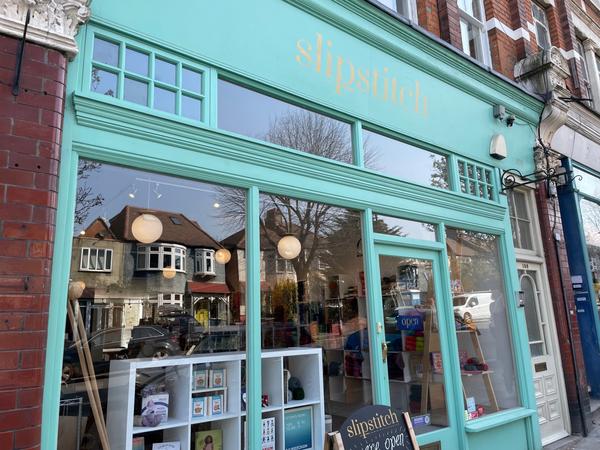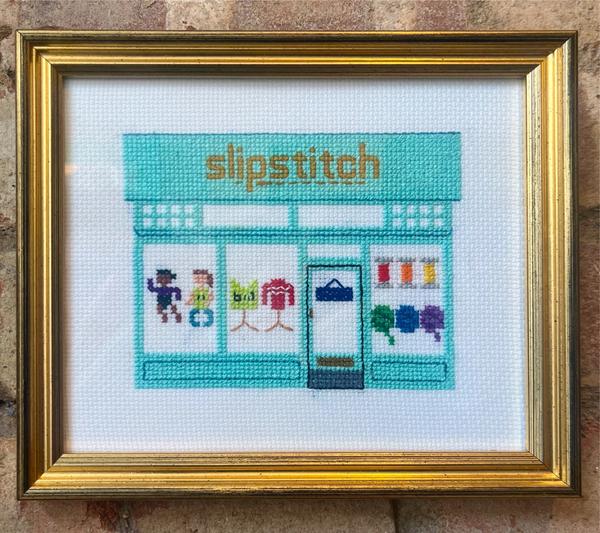Slipstitch, Queer Craft, and community spaces
Two weeks ago, I was at Queer Craft – a fortnightly meet-up at Slipstitch, a haberdashery and yarn shop near Alexandra Palace. I was working on a cross stitch piece of a train in a snowy landscape, chatting to my friends, admiring their creations, and gently snacking on a variety of baked goods.
This week, I wasn’t there, because Slipstitch closed its doors on Saturday.

I can’t remember exactly when I first came across Slipstitch, but I remember why. Slipstitch was sometimes the target of stickering campaigns from TERFs and anti-trans campaigners, who objected to Rosie’s vocal support of trans people. (Rosie is the shop’s owner and a dear friend.)
This discussion spilled onto Twitter, and at some point Rosie’s tweets appeared in my timeline. I saw the shop account calling out the stickers and re-affirming its support of trans people, and since I’m trans and I do lots of cross-stitch, I decided to check it out. I looked around the online store, thinking I might buy some thread – then I found an event called “Queer Craft”, and booked.
Turning up the next Monday, I was a bit nervous – would I be queer enough? Would I be crafty enough? For whatever reason, my mental image of a craft meetup is people doing knitting or crochet – does anybody bring cross-stitch to these things?
My nerves were quickly put at ease – Rosie welcomed me enthusiastically, and I settled in. I sat down at the table, put on a name badge, and took out my cross-stitch. As I stitched away, I started chatting to strangers who would soon become friends.
Queer Craft was every other Monday, and I began making regular trips to Muswell Hill for two hours of crafting and conversation. We’d admire each other’s work, and share tips and advice if somebody was struggling. The group was always generous with knowledge, equipment, and sympathy for unexpected snags – but the conversation often drifted away from our crafts.
As we got to know each other more, we developed in-jokes and stories and familiar topics. We’d talk about Taskmaster and the careers of cutlery salesmen. We’d discuss what it’s like to grow up in Cornwall. We’d chat about theatre shows and West End drama. Everyone made jokes about how I’m a spy. (I’m not a spy.) Rosie would tell us about the wrong way to make coffee. We passed around many, many photos of our pets.
I know that Rosie was always keen for Queer Craft to be welcoming to newcomers and not too “clique”-y – I suspect the rate of in-jokes made that difficult, but I admire the effort. (I wonder if that’s the fate of all groups designed to help strangers meet? Either it fizzles out, or a group of regulars gradually forms that makes it harder for new people to join.) I confess I was never too worried about this, because I was too busy having a nice time with my friends.
Craft is such a personal hobby, and we saw glimpses of each other’s lives through the things we were making, especially when they were gifts for somebody else. Somebody making a baby blanket for a friend, or a stuffed toy for a parent, or some socks for a partner. Everyone poured so much time and love into their work. It felt very intimate and special.
I’m always a bit nervous about how visibly trans to be, but that was never an issue at Queer Craft – something I should have known from the start, thanks to Rosie’s vocal support of her trans staff and customers. Everyone treated transness as so self-evidently normal, it didn’t bear comment.
Sometimes I was femme, and sometimes I was masc, and nobody batted an eyelid. (Apart from the time Rosie took one look at my officewear and described it as “corporate drag”, a burn so savage I may never recover.) That sense of casual, unconditional trans acceptance feels like it’s getting more common – but it’s still nice every time.
These friendships have spilled out of Slipstitch and into the world beyond. One Queer Craft regular is a published author, and some of us went to celebrate her at a book event. Several others are in choirs, and I’ve been to see them sing. Last year, I invited people round to my house for “Queer Crafternoon”, where we all crafted in my living room and ate scones with jam and cream.
Nine weeks ago, Rosie told us that she’d decided to close the physical shop. The world is tough for small businesses, and tougher for the person running them. I’m sad, but I could see how much stress it was putting on Rosie, and I respect her decision to put her own wellbeing first, and to close the doors on her own terms.
On Saturday, Rosie held a party to mark the closing of the space. The shelves were empty, the room anything but. There were Queer Craft friends, regulars from the other Meet & Make group, people who’d come to Rosie’s classes, regular customers, and other friends of the shop. The community around Slipstitch is much more than just the queers who met on Monday evenings. The shop was the busiest I’ve ever seen it, and it was lovely to see so many people there to celebrate and mourn.

I’m sure Queer Craft and our friendships will continue in some shape or form, but sitting here now, I can’t help but be a little upset about what we’ve lost. Of course, there are other haberdasheries, and there are other queer craft groups – it’s hardly a unique idea – but Slipstitch was the haberdashery where I shopped, it’s where our group met, and I’m sad to know it’s gone.
In her final newsletter before the closure, Rosie wrote “[Slipstitch] never wanted for community”. I think that’s a lovely sentiment, and one that rung true in my experience – it always felt like such a friendly, welcoming space, and I’m glad I found it. I hope the friendships forged in Queer Craft will survive a long time after the physical shop is gone. I know that Rosie wants Slipstitch to continue as an idea, if not a physical venue, and I’m excited to see what happens next.
Her words also made me reflect on the fragility of our community spaces – those places where we can meet strangers and bond over a common interest. They’re getting scarcer and scarcer. As every bit of land is forced into more and more commercialisation, we’re running out of places to just hang out and meet people. We often talk about how hard it is to make friends as an adult – and that’s in part because the spaces where we might do so are dwindling.
These community spaces are precious for queer people, yes, but for everyone else too. I’m sad that the shop has closed, and I’m sad that this iteration of Queer Craft is over, and I’m sad that this is a trend. These spaces are rare, and getting rarer – we shouldn’t take them for granted.